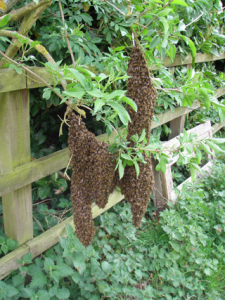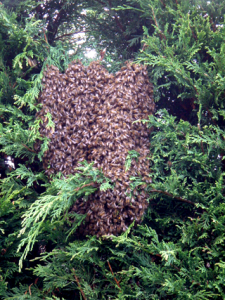So you think you have a swarm of bees!
What should you do?
There are many types of bee and other insects that are often mistaken for honey bees. Try to identify whether you have a honey bee swarm or whether you have a problem with some other type of bee or insect. The following guide should help you identify which type of insect you have. See also our Insect Identification page for images of insects commonly mistaken for honey bees.
Bumble Bees
Bumble bees build small nests in gardens, compost heaps, bird boxes etc. They do not grow to large colonies and generally do not bother people. Towards the end of summer virgin queens are produced and the nest will die off. The queens hibernate over winter and start the whole process again next spring, not necessarily in the same nest location.
As bumble bees are a protected species beekeepers cannot disturb them. So if you can leave them to get on with their work over the summer they should not bother you. You will also be able to watch important pollinators go about their work.
Wasps
Wasps are sometimes mistaken for bees. The way to tell the difference is that wasps have yellow legs and bees do not. If you have wasps you may need to contact a pest controller as they can become troublesome during summertime. If you require the services of a pest controller you may like to try Jason Hilliard who can be contacted on 01234 838391.
Honey Bee Swarms
Do you have a swarm of bees that looks similar to these:


If you find a swarm arriving in your garden:-
-
- DON’T PANIC ! Swarming bees may sound and look frightening but they are at their most harmless because they have very little to defend and are away from their hive. Often they are only with you for a few hours whilst they find a new home and fly off.
- Leave them to settle down and keep a sensible distance.
- Call for a beekeeper – see our Swarm Collectors List. Tell the beekeeper as much as you can. You will be asked questions that help the beekeeper to decide what it’s best to do and whether you have honey bees or some other insect such as bumble bees or wasps. Don’t be upset if the first beekeeper you call cannot help – they are all volunteers, and have jobs to do too.
- Enjoy watching the beekeeper at work putting the swarm in a container to take away.
- Make a donation to the Beekeepers Association. A beekeeper is not paid and is doing you a favour since the bees may be a nuisance to him or her, due to the expense, time and trouble of fetching and checking them, and also treating for diseases before they can safely be put with other bees. A commercial firm may charge you as much as £80 to remove a swarm, if they will do it at all. To donate, please click here and select Donation.
- Don’t expect beekeepers to do anything about swarms in inaccessible places such as chimneys or vents. Our insurance does not cover us for taking risks, and we cannot undertake any structural work to get at bees for the same reason.
During the day some of the swarm will already be out foraging for food and looking for a new home. Once the swarm is put into the box or skep it cannot be immediately removed. The returning foragers will not be able to find the swarm and are likley to turn angry and this may cause people and animals to be stung. The Beekeeper will return around sunset or when it is much cooler and remove the box or swarm and all the bees within it.
In a movable container they can usually be shifted completely, but if you think they are setting up home in your chimney the best course is to quickly make a smoky fire that puts them off and drives them to move out. Don’t leave it too long or make a big fire or you may end up with melted honeycomb dripping down into the hearth and soaking into the brickwork!
Beware of a swarm that has been caught out for days in bad weather. they can’t fly to a new home, they run out of food and are not able to forage for more. As a result they may become very defensive and may attack people who interfere with them.
If bees set up permanent home in your property (they choose cavities such as disused chimneys, compost bins, bird boxes, and hollow trees) you have a bigger problem. However, with the disease problems nowadays bees require active help from a beekeeper to survive. Wild colonies get no help and die out after a while.
